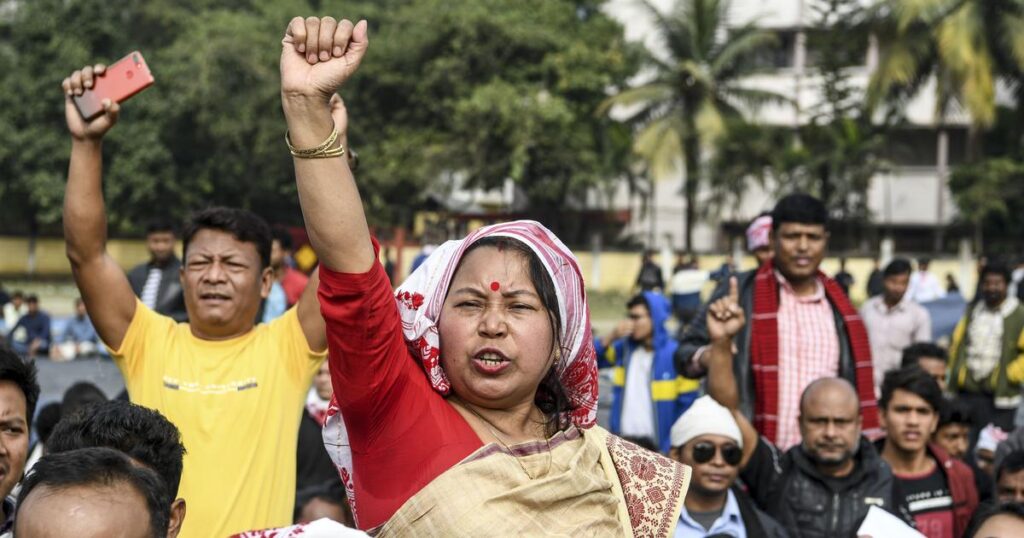(Image courtesy – DOT Talks)
Reports circulating indicate that the long-awaited rules under the contentious Citizenship (Amendment) Act (CAA) are finally prepared and set to be notified before the 2024 Lok Sabha elections. The CAA, a legislation passed in December 2019, has been steeped in controversy since its inception, drawing widespread criticism for its alleged discriminatory nature and its exclusion of Muslims from its provisions.
The CAA, introduced by Union Home Minister Amit Shah, aims to grant citizenship to Hindus, Parsis, Sikhs, Buddhists, Jains, and Christians fleeing persecution from neighboring Muslim-majority countries such as Pakistan, Afghanistan, and Bangladesh. However, it notably excludes Muslims, regardless of whether they face persecution in their home countries. This selective inclusion has been a focal point of criticism, with many accusing the law of being unconstitutional and discriminatory.

(Image courtesy – Scroll.in)
The Act was met with fierce opposition from politicians and citizens across the country, who took to the streets in protest against what they perceived as a violation of secular principles and an affront to the rights of Muslim citizens. Despite the protests and the ensuing violence, the government went ahead and notified the law in January 2020, sparking further outrage.
However, the rules necessary for the implementation of the CAA have remained elusive, until now. According to sources, the rules are ready, and the government plans to implement them before the upcoming elections. The rules reportedly require applicants to declare the year of their entry into India without travel documents, with no additional documentation requested from them. Additionally, requests from applicants who applied after 2014 will be processed according to the new rules.

(Image courtesy – iPleaders)
The Bharatiya Janata Party (BJP), the ruling party in India, has repeatedly promised to implement the CAA, with party leaders mentioning it in numerous rallies over the past few years. Most recently, Union Home Minister Amit Shah reiterated this commitment at a rally in West Bengal.
However, the legality of the CAA is still under scrutiny, with several petitions challenging its validity pending before the Supreme Court. In October, the Union government defended the law in court, describing it as a “benign piece of legislation.” Despite these legal challenges, the government appears determined to push forward with the implementation of the CAA and its accompanying rules.

(Image courtesy – OpIndia)
The prospect of implementing the CAA rules ahead of the 2024 Lok Sabha elections adds another layer of complexity to an already contentious issue. With political rhetoric surrounding the CAA likely to intensify in the run-up to the elections, it remains to be seen how the public will respond to this development.
Critics argue that the CAA, coupled with the proposed National Register of Citizens (NRC), poses a threat to the rights of minority communities, particularly Muslims, by potentially rendering them stateless. They contend that the CAA undermines India’s secular ethos and violates the principles of equality enshrined in the Constitution.
On the other hand, supporters of the CAA argue that it is a humanitarian gesture aimed at providing refuge to persecuted minorities from neighboring countries. They maintain that the law does not discriminate against any religious community within India and is essential for protecting the rights of persecuted minorities.
As the debate over the CAA continues to unfold, its implementation ahead of the 2024 elections is likely to reignite tensions and stir further controversy. The government’s decision to prioritize the notification of CAA rules underscores its commitment to fulfilling its electoral promises, but it also raises questions about the potential implications for India’s secular fabric and its standing as a pluralistic democracy.
In the coming months, all eyes will be on the Supreme Court as it deliberates on the legal challenges to the CAA. Regardless of the court’s verdict, the CAA remains a deeply polarizing issue that has sparked intense debate and division within Indian society. As the country prepares for another round of elections, the fate of the CAA and its impact on the political landscape are sure to remain at the forefront of public discourse.

